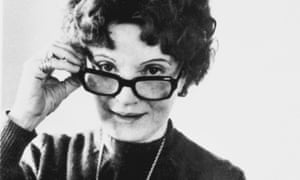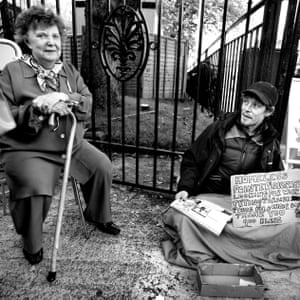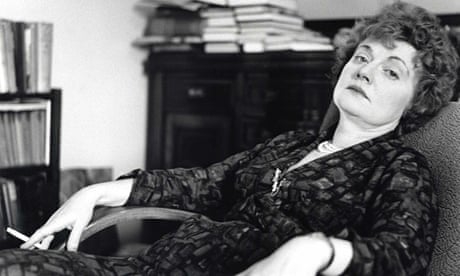
Ahead of the centenary of Spark’s birth, this beguiling memoir of a friendship is revealing of the novelist’s personal entanglements and Scottishness.
Born Muriel Camberg in Edinburgh in 1918 – stand by for the centenary celebrations next year – she was a very clever, attractive girl. Her promise and ambitions were stymied and swallowed up by the upheaval of the second world war, a hasty marriage to a deeply unbalanced man (Mr Spark, whose name she gladly took) and a child – Robin – born in Rhodesia when she was only 20. The 1940s and 50s were years of struggle and penury on the depressed fringes of literary life in London. It was only in 1957 with the publication of her first novel, The Comforters, extravagantly hailed by Graham Greene and Evelyn Waugh, no less, that the Spark career began to achieve significant lift-off.

Alluring and spirited … Muriel Spark.
In 1976, when I was in my early 20s, I wrote to Muriel Spark – I was an avid fan – asking if I could interview her at her house in Italy, in Arezzo. I was spending some weeks in Tuscany researching the death, in 1822, of Percy Bysshe Shelley and thought I might profit by interviewing some writers I admired who happened to live in the area. Spark declined, swiftly, politely: alas, it wasn’t convenient. It would be another 15 years before I met her.
Alan Taylor, author of this beguiling, fascinating memoir, had more luck. He went to Arezzo to interview her in 1990 and a lasting friendship ensued that went as far as regular house-sitting for her and her friend Penelope Jardine, as Muriel and Penny quit Italy in the hottest weeks of summer for more temperate climes. Taylor came to know her well in the last decade-and-a-half of her life. He was often called on to be her walker-cum-cicerone on trips she made, in failing health, to Oxford or New York or other places where she was being feted. She was Dame Muriel Spark, then, with a long literary career that seemed enviably successful. It’s only now, posthumously – she died in 2006 – that the riven complexities of her early life, the entanglements of her personal relationships and the various glosses and concealments that Spark deployed to enhance her elaborate myth are coming into sharper focus. The Spark persona becomes more and more fascinating.
Taylor’s familiarity with his subject gives him privileged access and insight into the numerous controversies that have dogged Spark’s life. His memoir is a valuable adjunct to Martin Stannard’s official biography. Taylor is particularly astute on the fraught roller-coaster of affection and animosity that dominated Spark’s relationship with her son Robin (1938-2016). Robin Spark became obsessed with the family’s Jewishness – an obsession that, ultimately, drove an immovable wedge between mother and son, especially given that Spark had converted to Catholicism in 1954. Spark’s life was always replete with literary gossip – much to her irritation. A writer she knew in New York said she used up friendships “like Kleenex”. One of the explanations for this glamorous, difficult persona that she developed – no fools were suffered for long – was that she was a late starter.
It’s only now, posthumously that the riven complexities of Spark's early life are coming into sharper focus
She never looked back and her unique gifts as a writer coupled with her indomitable nature ensured that the limelight never really dimmed. That there was a degree of reinvention can surely be excused: she had known real hardship in postwar London (wonderfully documented in her novels Loitering with Intentand A Far Cry from Kensington) and there was no way at all that she was going to descend from the heights she’d reached.
As the centenary of her birth approaches it’s a timely moment to assess and evaluate the real stature she has achieved as a novelist. The 22 novels she wrote – short, dry, comic, strange – reflect a tone of voice and a view of the world, its denizens and the human predicament that is as distinct as Chekhov’s. The fact that she was Scottish is another aspect that will focus attention. She was a writer who spent most of her life far from Scotland but who declared: “My formation is entirely Scottish.” And thereby hangs the dilemma that attaches itself to any writer who emerges from a small nation – James Joyce and Samuel Beckett would agree.
The historian Christopher Harvie came up with a neat analogy that has a real bearing on Spark and Scottish literature. He divided Scots into “Red” Scots and “Black” Scots (this idea was fruitfully developed by another Scottish historian, Angus Calder). Red Scots are cosmopolitan, enlightened – Scots on the make, some might say – and exiles. They have to leave Scotland to flourish. Black Scots, by contrast, are demotic, nationalistic, Anglophobic, doggedly tending the kailyard “back hame”.
This split-personality trope is echoed throughout Scottish writing, and has a few sub-varieties. There are Red Scots who never leave Scotland and Black Scots who choose to live abroad. No names, no pack-drill. And I think the same division probably applies throughout all literatures and cultures that are fed by small populations in small ponds. I’ve mentioned the Irish, but I’m sure there are Red and Black varieties of writers from Iceland, Corsica, Ivory Coast and Tasmania, for example.

With this in mind, the writer that Spark seems most to resemble is Robert Louis Stevenson, who was also born in Edinburgh but very swiftly left his native land. He became an exile and achieved great success in his short life, a life that ended in Samoa, further flung than Spark’s Tuscany, though, I suspect, the flight from home answered the same need. Stevenson wrote (in 1893): “Singular that I should fulfil the Scots destiny throughout and live a voluntary exile and have my head filled with the blessed, beastly place all the time!”
One of the great merits of Taylor’s memoir is that it echoes the same Stevensonian plaint. Spark, top to toe in haute couture, wealthy, famous, sought by the glitterati in London, New York and Rome, still had her head filled with the “blessed, beastly place”.

The 100 best novels: No 79 – The Prime of Miss Jean Brodie by Muriel Spark (1960)
Her small pond, Edinburgh, was even smaller in that she came from Jewish stock. When she was born, there were maybe 400 Jewish families in Edinburgh. Wholly assimilated as Scottish Jewry is, it was still a distinguishing feature, particularly in Spark’s youth and adolescence. Yet her virtues, paradoxically, are Scottish Presbyterian. Taylor expresses these principles succinctly: “Her ethic was Presbyterian: Life is what you make of it. What one achieved was by one’s own efforts. Take nothing for granted. Expect no favours – nor for that matter much in the way of thanks or praise.”
This is the code Spark lived by, as did Stevenson. The code can warp perversely and produce paranoia, animus, self-doubt and delusion – and one can see the darker consequences of her upbringing and its ethos in both her life and work. But at root there is a healthy stoicism engendered by such an uncompromising weltanschauung – it will, on the whole, serve you well, as it served Spark.
There is a half-mocking comment that sees Scotland “as a psychiatric condition” rather than a nation. Perhaps, if valid, it’s a condition most experienced by Scotland’s writers. Stevenson himself nailed it in The Strange Case of Dr Jekyll and Mr Hyde – the ultimate, enduring metaphor of the split-personality trope – but Spark exhibits the same symptoms, though in a more complex, less binary manner. She remains a most fascinating, multilayered, alluring, spirited writer. I have a feeling that posterity will come to recognise that more and more.
No comments:
Post a Comment